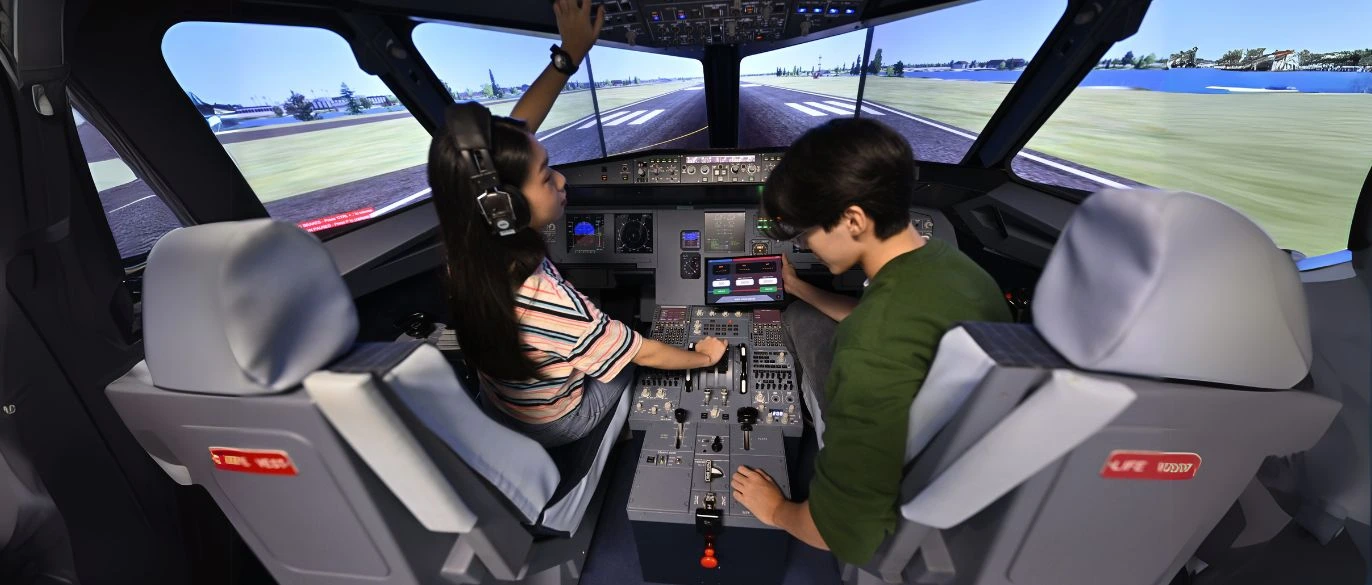
Dream of mastering the technology that powers flight? Join aerospace electronics at SP, where your problem-solving skills and passion for aviation electronics become real-world expertise in aircraft controls—ideal for aviation enthusiasts and aspiring pilots. Train in SP’s modern labs, gaining hands-on skills and confidence to soar. Start your aerospace journey with SP and lead the future of flight technology.
In addition, you will graduate with a Minor upon the completion of a suite of related elective modules. SP offers 6 Minors for you to choose from:
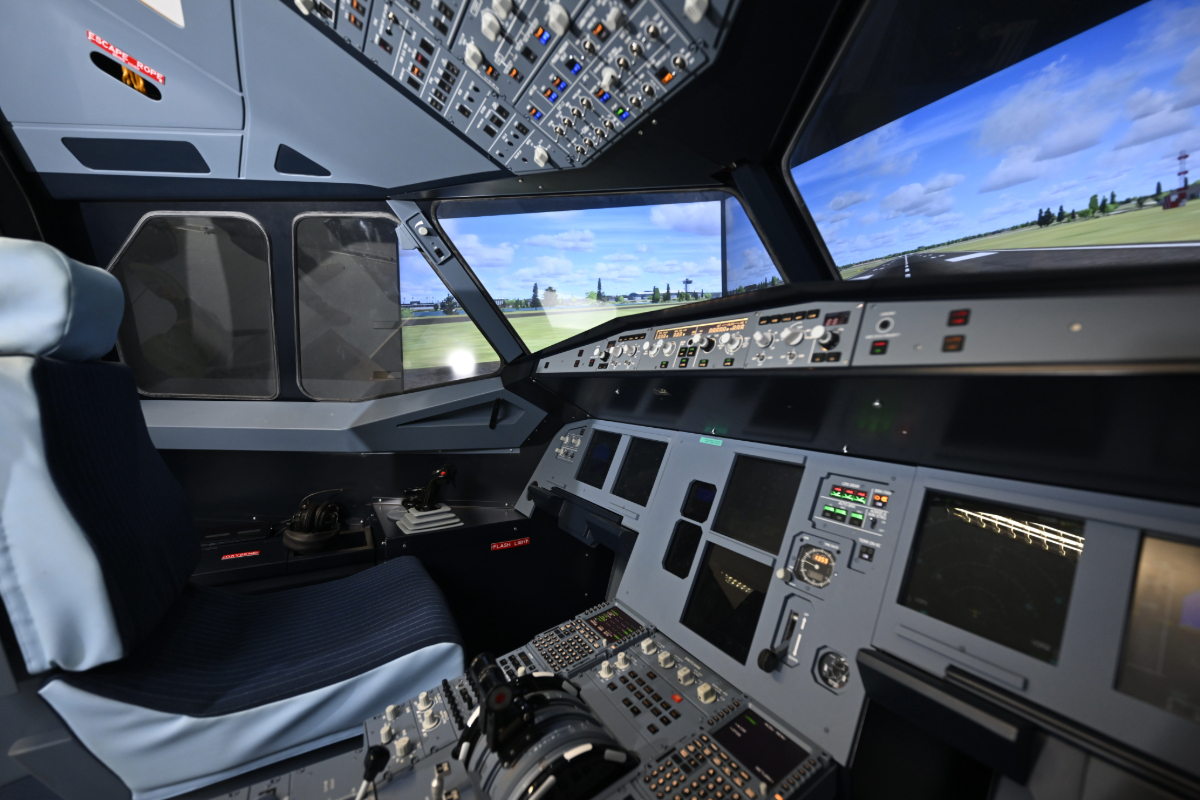
This diploma enhances your technical skills and innovative thinking, crucial for the aerospace field. These skills help you understand how technological advancements can be applied in real situations. You'll work on industry projects, gaining practical experience and preparing you to succeed in the fast-changing aerospace industry.
The Diploma in Aerospace Electronics (DASE) specialises in avionics—the internal electrical and electronic systems that control aircraft. In 2025, DASE highlights the role of emerging technologies, such as AI and automation in enhancing system reliability and performance. This focus makes aerospace electronics crucial for advancing aviation technology, paving the way for safer, smarter, and more connected air travel.
Through aerospace electronics, you can see its impact on both aviation and space exploration. Without it, global travel and exploration would not be possible. This field lets you drive advancements that make travel smoother and more efficient, improving life for everyone.
Please note: Course structure is subject to change.
Electives
The SP elective framework offers students options to pursue their passion and/or meet different career needs, and is an integral part of the holistic education we seek to provide to our students.
Learn about SP Elective Framework
The Common Core Curriculum (CCC) prepares you for a changing world with essential human and digital skills. Through its 10 modules, the CCC also provides a wide learning experience to examine local and global issues based on the Sustainable Development Goals (SDGs). These modules help you understand real-world issues and the impact on different communities, and equip you with skills to create a better, sustainable Singapore and world.
Learn about Common Core Curriculum
Equips students with the knowledge of drawing office practice, ISO drawing standards and drawing skills using latest AutoCAD software and the ability to read and produce good technical sketches and projection drawings as a form of engineering communication. The module will cover basic 2D drawings, isometrics and orthogonal projections, 3D-Design using Autodesk software for 3D-Printing & Laser cutting assignments, and the use of workstation based CAD/CAM software for computer-aided drafting.
This module provides a general overview of computer networking. It provides a general introduction to networking terminology, concepts, devices, functionality, applications and standards required for computer networking. Students will learn to build simple LANs, perform basic network and service configurations, and implement IP addressing schemes.
Introduces students to the knowledge, understanding and design techniques necessary to enable them to design simple combinational circuits using commercial SSI and MSI integrated circuits. Additional topics covered include introduction to simple sequential logic circuits such as flipflops and mono-stables
Builds on basic material covered earlier with advanced topics such as adders, multiplexers/ demultiplexers, decoders/ encoders, counters and shift registers and some application examples of these circuits.
This module covers the fundamental concepts of electricity. Understanding and application of electrical phenomena are further enhanced using circuit simulation on worked examples and tutorial problems and via hands-on sessions. Topics covered include scientific notation, engineering notation, metric prefixes, basic elements of an electrical circuit, definitions of energy and power, power sources, measuring instruments, DC and AC concepts, simple series and parallel networks, electromagnetism, inductor, inductance, transformers, capacitor and capacitance, characteristics of inductor and capacitor in DC, Kirchhoff’s Voltage and Current Laws, Current and Voltage Divider Rules and Superposition Theorem.
Extends the basic concepts onto other electrical and electronic devices. Topics covered include: Semiconductor physics, semiconductor devices such as diodes, special diodes and bipolar transistors, transducers such as thermistors, and application of operational amplifiers, complex numbers and concepts of phasors, phasor angle, phasor diagrams, reactances, impedances, susceptances and admittances. Upon completion, this module consolidates students’ foundation of the electrical and electronic engineering.
This module equips students with engineering fundamentals set in the context of CDIO (conceive, design, implement and operate) in real-world systems with basic electronic projects. It aims to nurture students toward self-directed learners by giving them a challenging environment to plan, manage, review and extend their learning outcomes using growth mind-set and meta-cognitive learning systems in achieving their electronic projects. Besides, students will be exposed to a range of generic process skills such as troubleshooting skills, creative and critical thinking, teamwork and communication.
This module teaches students to write programs in a structured way. It emphasises on good programming techniques and covers topics on fundamental data types, input / output, selection control and loop constructs, functions and basic structures such as arrays. At the end of the module, the students will be able to write programme for simple engineering application that runs on computer and simple engineering application that runs on basic embedded system and control it.
This module equips students with basic mathematical skills and knowledge in Algebra and Trigonometry to enable them to understand and solve engineering problems encountered in the course of studies. It also serves as a foundation for subsequent mathematics modules.
This module equips students with the necessary mathematical knowledge and skills to solve problems encountered in their course of study. Among the topics covered are Determinants and Matrices, Complex Numbers and Calculus.
Develop critical and analytical thinking skills, along with the ability to present your point of view with credible and relevant evidence. Enhance your knowledge and appreciation of local and global issues covered in the 17 SDGs, with a focus on the former.
Develop data fluency skills such as formulating questions, processing and analysing data to articulate numerical and graphical summaries. Build a simple data dashboard to generate insights and support a solution for a chosen SDG.
Develop data visualisation skills and apply narrative elements and persuasive delivery techniques to communicate data effectively. Learn to craft compelling narratives, based on hard facts and data, to call stakeholders into taking action to tackle the SDGs.
Appreciate the use of both creative and computational thinking skills to solve a SDG-related problem. Apply focused and diffuse thinking , brainstorming techniques, and the four pillars of computational thinking to a chosen SDG.
A compulsory module for all first year students, ECG 1 aims to develop an understanding of personal interests, strengths, values and life goals. With greater knowledge and understanding of self, planning and decision making in choosing a future career can be better developed. Some topics covered in ECG 1 include ‘Defining My SP Life’, ‘Personal Branding’, ‘Discovering My Interests’, ‘Planning for Success – My Personal Action Plan’ and more.
Provides students with an understanding of circuit theory, which includes mesh analysis, nodal analysis, circuit theorems and applications. The students will also be introduced to three-phase circuits, covering three-phase supply and loads. This module provides the basic foundation leading to final year subjects.
Provides students the basics in electronics and servomechanism components that serve as building blocks for aircraft control systems. These building blocks will be used to introduce feedback control system concepts and terminology to the students. At the completion of this module, the students should be able to understand the elements of aircraft servomechanisms, their functions and performance.
This module covers the fundamentals of electricity generation and network of components that generate, transmit, distribute, utilise and store electrical energy in aircraft. These includes different types of DC sources, particularly the primary and secondary cells of aircraft batteries, DC motor and generator constructions and operation principles. Topics on single and multi-phase AC and DC power generators, transformers and motors will be taught. In addition to the fundamentals, the module introduces topics such as electrical power converters, conditioners and protections, aircraft flight controller systems including fly-by-wire systems, aircraft internal and external lightings, ice and rain protection systems, aircraft fire protection and extinguishing systems, landing gears operations, aircraft ignition, heating systems, electrostatic protection and electrical bonding techniques used in aircraft.
Apply human factors and error management in aviation context. This includes understanding of human limitations and errors, organisational factors and working environment that might contribute to incidents and accidents. Coordinate and direct the organisation’s activities to meet customer and regulatory requirements as well as identify opportunities for improvement.
The objectives set are intended to provide the students with a good knowledge on different type of aircraft materials, aspects of corrosion, common types of fasteners, rivets, springs, pipes, bearings, transmission and control cables used. Hands-on experience will be provided to cultivate safe practice habits; equipment installation and maintenance in an aeroplane. Students will also have opportunities to develop their thinking skills, problem solving skills and interpersonal skills such as teamwork and communications in the CDIO project.
Integrate automation technologies and robotic systems to enhance precision and productivity and reduce reliance on manual tasks to execute aircraft operational activities.
Interrelate computing devices, equipment and machines data in a networked environment to provide specific solutions. Develop cyber risk assessment and treatment techniques to ensure appropriate levels of protection, confidentiality, integrity and privacy in alignment with the security framework.
The module is designed to provide students with further knowledge in mathematics and analytical skills to solve engineering problems encountered in their studies. Among the topics covered are Calculus, Ordinary Differential Equations, Laplace Transforms and Fourier Series.
This module aims to provide students with an introduction to statistics and data analytics. The topics in statistics include descriptive statistics, probability, random variables, probability distributions, sampling distributions, and estimation. The topics in data analytics include a brief overview of data mining, cluster analysis, decision tree classifier, and simple and multiple linear regression. Software tools will be used throughout for hands-on exercises.
ECG 2 is taken by all second year students. This module aims to develop professional skills necessary to seek and secure work. It also guides the students on how to discover and develop skills, knowledge and attitudes needed for work effectiveness and changes related to work. Topics covered in this module include ‘Job Search and Market Trends’, ‘Discovering Your Unique Selling Point’, ‘Resilience’, ‘Work Place Values’ and more.
Work in multi-disciplinary groups to apply design thinking methods, backed by research and qualitative data, to tackle local sustainable issues mapped to the SDGs. Tap into knowledge and skills learnt in CCC modules to create innovative prototypes for real-life issues faced by local communities.
Please refer to Elective Modules Framework for more information.
Apply Your Knowledge in Real-World Settings
Apply your skills in the real world by engaging in an internship and a industry project to gain industry experience. Modules like Aircraft Communication & Navigation Systems and Artificial Intelligence & Data Analytics in Aerospace keep you updated on the latest advancements. The Common Core Curriculum and electives ensure you’re ready for the future.
By the end of Year 3, you’ll be ready to start your career in aerospace electronics.
Maintain aircraft communication systems using appropriate resources and conduct functional tests after maintenance work. This includes maintenance of radio and audio communication systems, radio emergency and reporting systems, and in-flight entertainment systems.
Maintain aircraft instrument systems using appropriate resources and conduct functional tests after maintenance work. This includes maintenance of air data systems and instruments, gyroscopic instruments and compass systems, indication and warning systems, and flight data recording systems.
Apply algorithmic, statistical and engineering knowledge to integrate Artificial Intelligence (AI) into engineering processes for aerospace systems.
Introduces the principles of flight governing heavier than air flying machines. Topics covered include the standard atmosphere, basic aerodynamics, aircraft performance, high-speed flight, and stability & control.
The Internship Programme aims to provide students with an authentic on-the-job work experience in an engineering, or technology-enabled business field, to prepare them to be truly work-ready. Students will also be able to establish an industry network and learn from the experience of working professionals. Students will undergo a structured learning programme, including attending safety induction and participating in the industry projects as part of their internship. The intent of the programme is to enable students to apply and enhance their range of technical skills, hone their knowledge in areas such as professional ethics, role and responsibility of engineers, and understand the business environment in which companies are situated – as advocated by the CDIO syllabus. By the end of the programme, students will have a greater insight into what industry expects of employees, as well as opportunities to develop technical workplace competencies and other important professional skills.
Please refer to Elective Modules Framework for more information.
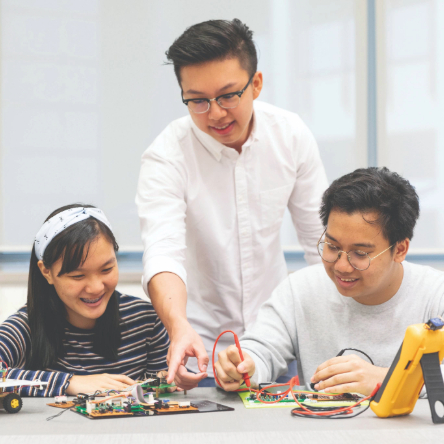
What are the eligibility requirements for aerospace electronics?
Applicants should not be suffering from severe vision deficiency (including colour vision), acute hearing impairment or uncontrolled epilepsy. Interested applicants with any of these conditions are advised to contact Singapore Polytechnic for more information.
You must meet the following criteria to qualify for the Diploma in Aerospace Electronics:
Applicants must obtain:
i) the following GCE 'O' Level grades at not more than two sittings and
ii) 26 points or better for the net ELR2B2 aggregate score (i.e. English Language, 2 relevant subjects and best 2 other subjects, including CCA Bonus points)
| Subject | Minumum Grade |
|---|---|
| i) English Language (as 1st Language) | D7* |
| ii) Mathematics (Elementary / Additional) | C6 |
iii) Any one of the following subjects • Biology • Biotechnology • Chemistry • Combined Science • Computing / Computer Studies • Design & Technology • Electronics / Fundamentals of Electronics • Physical Science • Physics / Engineering Science • Science (Chemistry, Biology) • Science (Physics, Biology) • Science (Physics, Chemistry) | C6 |
*Applicants offering SPM / UEC qualifications must attain a minimum grade A+ to C / 1 to 6 for their Bahasa Inggeris (1119) / English Language.
SPM Grades A+ to C are equivalent to GCE 'O' Level Grades 1 to 6.
Note: IGCSE / GCSE Grades A to C is comparable to GCE 'O' levels Grades 1 to 6 and IGCSE / GCSE Grade D is comparable to GCE 'O' Grade 7.
(For those with new IGCSE / GCSE Grades 9 to 1, Grades 9 to 4 would be comparable to GCE 'O' levels Grades 1 to 6 and IGCSE / GCSE Grade 3 is comparable to GCE 'O' Grade 7).
Net ELR2B2 Aggregate Range (2025 JAE): 5 to 11 points
2025 Planned Intake: 78
The JAE ELR2B2 indicates the net aggregate score of the lowest and highest ranked students who were admitted to these courses in the JAE. These aggregate scores are meant as a reference for applicants applying to these courses, and do not constitute the admission scores for subsequent admissions exercises.| Subject | Grade |
|---|---|
| i) General Paper (English Medium) OR Knowledge & Inquiry | A - E |
| ii) H2 Mathematics | A - D |
| iii) H2 Physics | A - D |
^ - Admission to the 2.5-year diploma course is based on merit.
Higher Nitec holders must have a minimum Grade Point Average (GPA) of 2.0.
Unless otherwise stated, the course duration of a Diploma course is 3 years.
| Relevant Higher Nitec |
|---|
| Advanced Manufacturing / Engineering with Business |
| Aerospace Engineering |
| Business Information Systems |
| Electrical Engineering |
| Electro-Mechanical Engineering |
| Electronics Engineering / Industrial Electronics Engineering |
| Facility Management |
| Information Technology |
| Integrated Mechanical & Electrical Design |
| IT Applications Development |
| IT Systems & Networks |
| Mechatronics Engineering |
| Robotics & Smart Systems |
Nitec holders must have a minimum Grade Point Average (GPA) of 3.5.
| Relevant Nitec |
|---|
| Aerospace Avionics |
| Aerospace Technology |
| Built Environment (Mechanical & Electrical Services) |
| Built Environment (Vertical Transportation)/Facility Technology (Vertical Transportation) |
| Communications Technology |
| Electrical Technology (Lighting & Sound) |
| Electronics & Internet of Things |
| Electronics / Electronics Servicing /Electronics (Broadband Technology & Services) /Electronics (Computer & Networking) /Electronics (Computer Technology) /Electronics (Disk Media) /Electronics (Instrumentation) /Electronics (Manufacturing) /Electronics (Mobile Devices) /Electronics (Video Technology) /Electronics (Wafer Fabrication) /Electronics (Wireless LAN) |
| Electronics, Computer Networking and Communications |
| Electronics (Display Technology) |
| Mechatronics & Robotics |
| Microelectronics |
| Web Applications |
ADMISSIONS CRITERIA
For O-Level students: Net ELR2B2 aggregate score of 26 points or better for the GCE O-Level exam and minimum entry requirements for the respective diploma courses
For ITE students:
a) Final net GPA 3.5 or better for Nitec holders
b) Final net GPA 2.0 or better for Higher Nitec holders
Applicants will be notified by emails In the month of July/August
Remark: STEM stands for Science Technology Engineering and Mathematics
Write-up Tips
Tips for Interview
The duration of the interview is around 30min in the form of group interview with a panel of staff.
For working adults, you must be Singapore Citizen (SC) or Permanent Resident (PR) with at least two years of relevant work experience. The examples of work experience / Job roles for the respective EEE Diplomas are as shown below.
For DASE (Diploma in Aerospace Electronics), examples of work experience / job roles includes but not limited to the following:
More Information on EAE Application
All You Need to Know About EAE
If you enjoy solving technical problems, working with avionics, and being around aircraft, aerospace electronics could be the right choice for you. This course suits students with logical thinking, adaptability, problem-solving, analytical skills, and programme-planning abilities. These traits will help you excel in projects, tackle technical challenges, and thrive in the dynamic aerospace field.
SP offers many scholarships to recognise talent and service, from Year 0 to after graduation. These scholarships provide tuition fee waivers and chances to represent SP. They are awarded for academic excellence, contributions to arts or sports, and community service. Edusave awards and external sponsorships are also available.
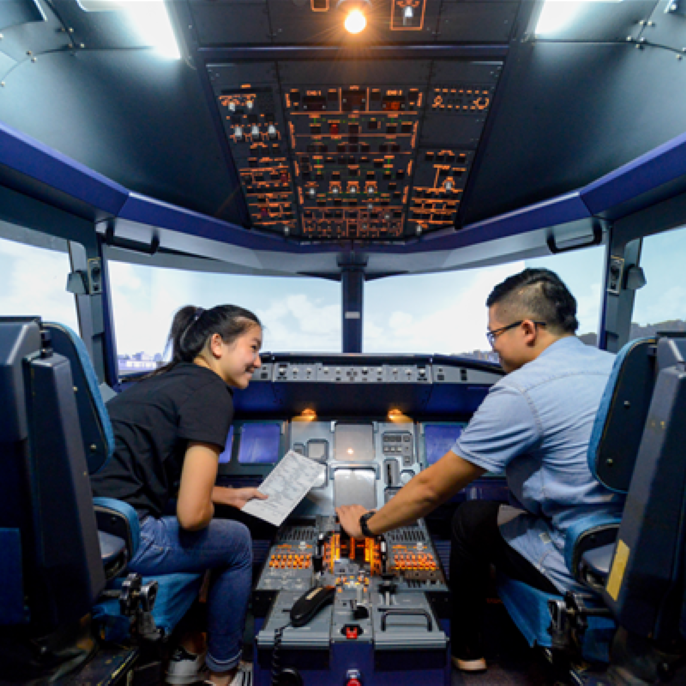
Aerospace electronics at SP prepares me for the future.
The Aerospace Engineering Hub offers a diverse range of hands-on projects, from unmanned aircraft to advanced autopilot systems. Modern facilities include the Aircraft Systems and Maintenance Lab, Automatic Flight and Electronics Systems Lab, and A320 Flight Simulator. These immersive environments provide realistic system operations in a safe and controlled setting, ensuring you develop essential skills to excel in the aerospace industry.
Aerospace electronics at SP prepares me for Singapore.
Aerospace electronics at SP prepares students for roles in the design and maintenance of More Electric Aircraft (MEA) systems, supporting the shift towards environmentally friendly aviation. The course focuses on developing technologies for short-distance electric planes, contributing to reducing emissions and advancing Singapore's goals for sustainable and efficient urban mobility, positioning graduates at the forefront of aerospace innovation.
Aerospace electronics at SP prepares me for the world.
Aerospace electronics at SP offers various options for you to explore:
These diverse fields ensure you gain deep knowledge and skills, preparing you to lead in various aerospace careers with confidence and expertise.
Aerospace electronics students participate in a 22-week internship at startups, SMEs, MNCs, and government agencies, including ST Engineering Aerospace, SIA Engineering Company, DSTA and A*STAR. You'll learn to use engineering tools, apply the right techniques, and develop systems integration skills. Many interns outperform university peers, often securing advanced roles like Avionics System Engineers through significant contributions.
Internships connect you with industry professionals, offering job insights and opportunities. SP supports with coaching to boost your confidence and employability. Experiencing diverse internships broadens your career perspective, leading to informed decisions, higher starting salaries, and business exposure. A quality internship provides meaningful work, learning opportunities, professional growth, and guidance from mentors.
Overseas exposure helps broaden your horizons. Understanding globalisation and working with diverse cultures is important in a global city like Singapore. Aerospace electronics students and alumni have experienced international internships and exchanges such as the 6-week immersion programme to Japan, enriching their worldviews and career prospects. Students in other CCAs also have opportunities to represent Singapore abroad and gain international experience.
We know some of you want to push yourself further and take on more challenges. Stepping out of your comfort zone and being more active can help.
Challenge yourself and step out of your comfort zone by participating in competitions. SP students have excelled in events like the Drone Odyssey Challenge, RoboRoarZ, NTU Deep Learning Week Hackathon, National Robotics Competition, and Singapore Amazing Flying Machine Competition. These achievements build confidence, test your skills, and help you grow from the experience.
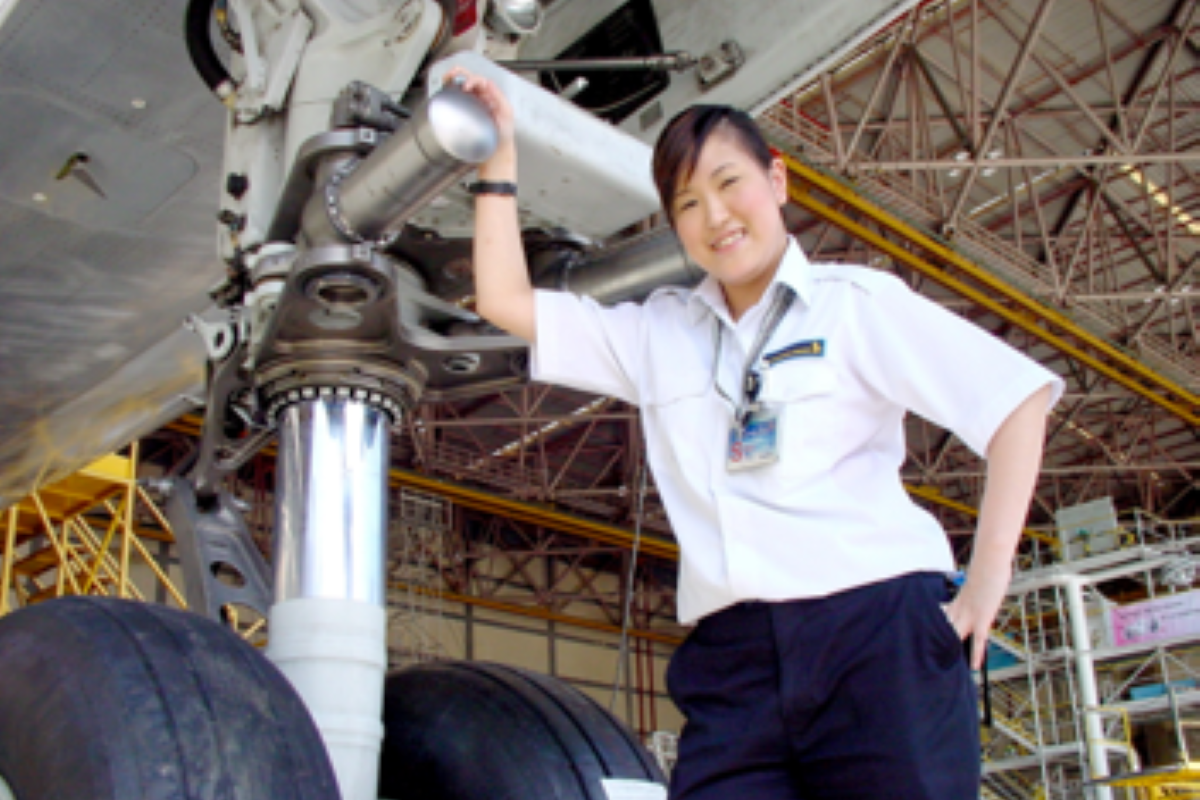
With a Diploma in Aerospace Electronics, you can continue your education or start your career. More than two-thirds of SP graduates continue their studies at local and international universities, with SP diplomas recognised by over 150 universities worldwide. Many receive over a year of advanced standing. Alternatively, you can jump straight into the workforce at companies like SIA Engineering Company, ST Aerospace, Rolls-Royce, Singapore Technologies Engineering, and Thales.
Both paths offer valuable opportunities to grow your knowledge and shape your future in aerospace electronics.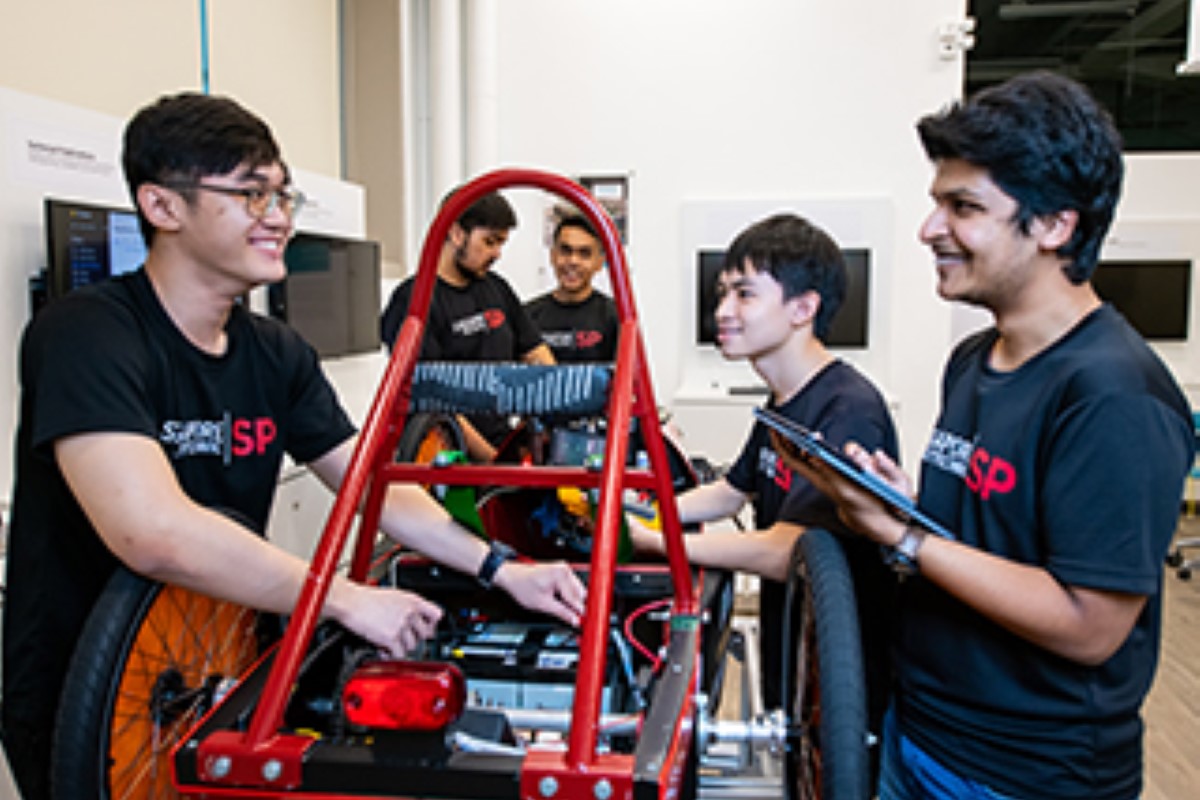
The aerospace industry offers many career paths, depending on your career choice. Exploring different sectors can help you decide on a full-time job. Common roles include Avionics Engineer and Systems Analyst. With technology advancing rapidly, the demand for aerospace engineers is high, making it a great field to enter.
Internships in different sectors can help you find your ideal career path.
Career Options:
Many aerospace electronics graduates pursue further studies to deepen their expertise or explore related fields. Alumni have pursued degrees such as:
These degrees are offered by local universities like NUS, NTU, SUTD, and SIT, as well as international universities such as the University of Glasgow and Embry-Riddle Aeronautical University.
For a full list of degree options and advanced standings, visit the Advanced Standing Database.
If you’re preparing for university and want to make the most of your diploma time, an SP diploma can let you fast-track your education by 0.5-2 years!

SP Engineering Scholar | DSTA Polytechnic Engineering Scholar | Class of 2024 During my internship at DSTA, I worked on enhancing the training experience for Air Force Engineers by designing and developing a Mixed Reality Application using Microsoft HoloLens 2. My C++ programming skills, developed in my first year at SP, were crucial in streamlining the application’s development, allowing me to customise innovative training solutions. This experience has deepened my passion for technology and its potential in bolstering defence.
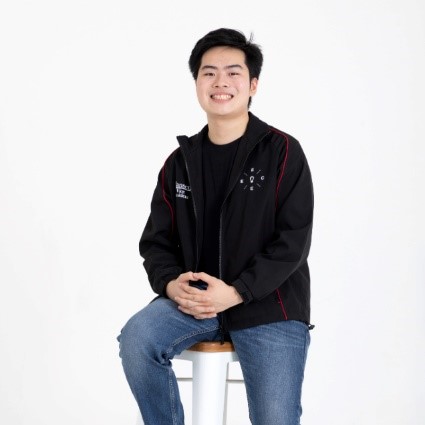
Siemens Prize Award Recipient | SAF Military Domain Expert Scheme (MDES) Study Award (Diploma) | SP Engineering Scholar | SAF Engineering Scholar | Class of 2022 I greatly appreciate SP's resources and efforts in preparing graduates for the workforce. The engineering modules I attended, such as aircraft communications, navigation systems, network fundamentals, and digital electronics, provided valuable knowledge. This foundation has been instrumental in my training as an Air Operations & Systems Expert, enabling me to correlate information and contribute meaningfully to the organisation.
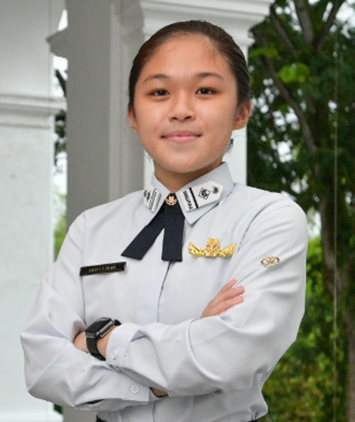
Lee Kuan Yew Award Recipient | ST Aerospace Gold Medallist | Alfred Robert Edis Prize Recipient | OCBC Prize Recipient | Klass Engineering and Solutions Prize Recipient | MOE Teaching Scholar | Class of 2022 The DASE course at Singapore Polytechnic equipped me with industry-relevant skills and leadership experience. At ARTC, I developed a Smart Inline Inspection Station, showcasing innovation and teamwork. Roles as Vice-President of EEE Student Ambassadors and Co-President of SP-IES enhanced my leadership abilities. Winning Gold at the International Standards Olympiad inspired me to use engineering for meaningful impact.
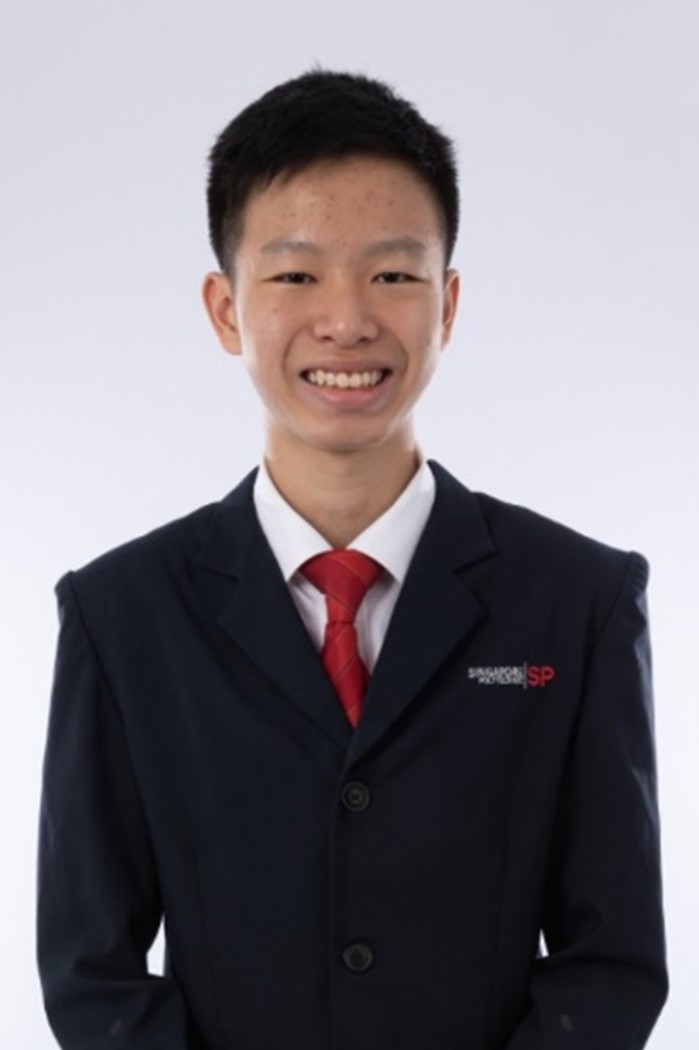
DASE Gold Medallist | Lee Kuan Yew Award Recipient | Public Service Commission (PSC Scholar) | Overseas Scholar (Engineering) | Class of 2021 The well-rounded and hands-on curriculum of SP’s Diploma in Aerospace Electronics, combined with advanced facilities, have provided me with a solid foundation in electrical and electronic engineering. I am confident I can apply my skills and knowledge to come up with innovative solutions that will make the world a better place for mankind.

DASE Gold Medallist | Recipient of the Nanyang Scholarship | Class of 2020 The broad based curriculum and advanced facilities in SP's Diploma in Aerospace Electronics have empowered me with a core foundation in engineering. I am now more confident in tackling challenges and look forward to developing and improving engineering solutions for a better tomorrow.
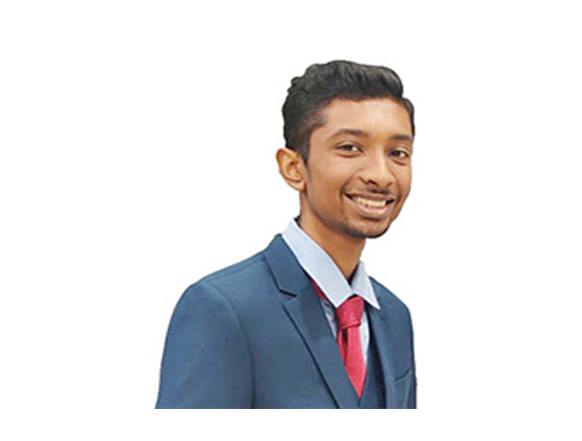
DASE Gold Medalist | Recipient of the NUS Engineering Scholarship | Class of 2019 Singapore Polytechnic has shaped my passion to become an engineer Through the hands-on lab sessions and real-life projects, I learnt to be resourceful and to think critically The DASE course has also given me the opportunity to intern with an aeronautical company in China which opened my eyes to the aviation industry.

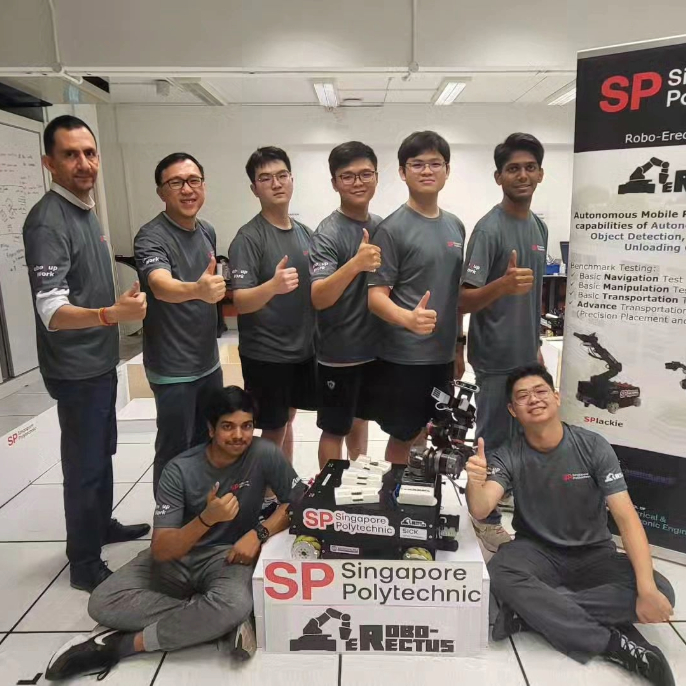

Singapore Polytechnic
500 Dover Rd Singapore 139651
Last updated: 04 February 2025
© 2024 Singapore PolytechnicBest viewed using latest version of Microsoft Edge, Mozilla Firefox, Safari and Google Chrome.
